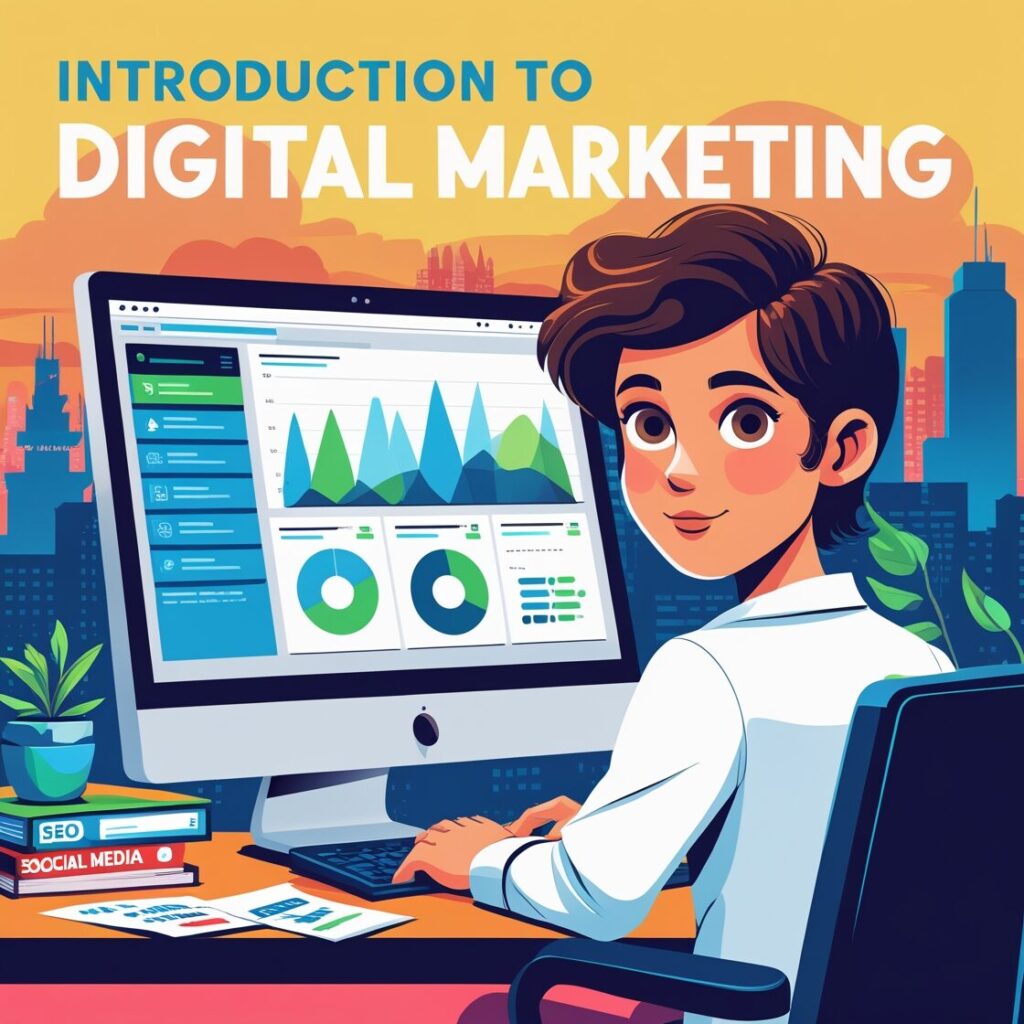Introduction to Digital Marketing

In the contemporary business landscape, digital marketing has ascended to prominence as a crucial element for success. Digital marketing refers to the use of digital channels and technologies to promote products or services, connect with consumers, and drive brand awareness. Unlike traditional marketing methods, which often rely on print ads, television commercials, and physical storefronts, digital marketing is characterized by its ability to leverage online platforms such as social media, search engines, email, and websites for targeted engagement. This shift towards digital avenues has transformed the marketing sphere, providing businesses with a more dynamic and interactive means of reaching their audiences.
The importance of digital marketing cannot be overstated. In an era where consumers increasingly turn to the internet for information and shopping, businesses that fail to adopt digital strategies risk falling behind their competitors. The reach of digital marketing extends beyond geographical boundaries, allowing businesses to access global markets and connect with diverse customer segments. This global aspect facilitates enhanced consumer insights and data analytics, enabling marketers to tailor their strategies and deliver personalized experiences.
Furthermore, the demand for skilled digital marketers continues to rise across various industries. As more companies allocate substantial budgets towards digital marketing initiatives, the need for professionals who can navigate this complex landscape is growing exponentially. From search engine optimization (SEO) to social media management, companies are seeking talented individuals who possess a blend of creative and analytical skills to drive their digital campaigns. As a result, those equipped with specialized digital marketing skills are positioned for lucrative opportunities, thus underscoring the necessity of developing expertise in this field to thrive in a digitally-driven economy.
Search Engine Optimization (SEO)
In the realm of digital marketing, Search Engine Optimization (SEO) stands out as a critical skill that can significantly enhance online visibility and traffic. The primary goal of SEO is to improve a website’s ranking on search engine results pages (SERPs) through various techniques aimed at attracting organic visitors. Mastering SEO involves several components, including keyword research, on-page optimization, link building, and technical SEO.
Keyword research is the foundation of effective SEO. It involves identifying relevant terms and phrases that potential customers are using to find products or services. By integrating these keywords strategically into website content, businesses can enhance their chances of ranking higher. Following this, on-page optimization focuses on fine-tuning individual web pages to boost their rankings. This includes optimizing title tags, meta descriptions, and headers, as well as ensuring that content is engaging and valuable to users.
Link building is another essential aspect of SEO. It refers to acquiring hyperlinks from other websites, which signal to search engines that the content is credible and worthy of ranking. A robust link building strategy not only enhances authority but also drives referral traffic, which can be instrumental in achieving business objectives. Finally, technical SEO encompasses the backend elements of a website, such as site speed, mobile-friendliness, and structured data, all of which are crucial for ensuring a seamless user experience and helping search engines crawl and index sites effectively.
The importance of SEO in driving organic traffic is paramount, as higher visibility often correlates with increased conversions and revenue. Real-world success stories abound, highlighting the potential of skilled SEO professionals. For example, a small e-commerce business that invested in SEO managed to increase its organic traffic by over 300%, leading to a significant upturn in sales. By mastering these SEO principles, individuals can unlock numerous high-paying job roles or lucrative freelance opportunities, confirming the value of this digital marketing skill in today’s landscape.
Content Marketing Mastery

Content marketing plays a pivotal role in the digital marketing ecosystem, serving as a strategic approach to attract, engage, and retain an audience. At its core, content marketing focuses on the creation and distribution of valuable, relevant content that not only resonates with target demographics but also drives profitable customer action. The art of storytelling is crucial here; it helps to craft narratives that connect with consumers on a personal level, community formation, and brand loyalty.
Different types of content exist within this domain, including blogs, videos, infographics, and podcasts. Each format comes with its own advantages and is suited for different objectives. For example, blogs are effective for SEO and driving organic traffic, while videos can engage viewers visually and emotionally. Infographics, on the other hand, simplify complex information, making it digestible and easy to share. The versatility in content types allows marketers to adapt their strategies based on audience preferences and technological advancements.
To manage these diverse content types, proficient use of content management systems (CMS) is essential. A robust CMS not only aids in the creation and organization of content but also offers tools for analyzing performance metrics. Understanding audience engagement through analytics informs marketers about which content resonates most, guiding future strategies and ensuring a continuous cycle of improvement.
For those seeking to thrive in the field of content marketing, the income opportunities are abundant. Skilled content marketers can explore multiple avenues such as freelance writing, consulting, or even secure positions with agencies. With brands increasingly recognizing the importance of good content in building their online presence, expertise in content marketing can lead to rewarding financial prospects, boosting both individual careers and collective brand narratives.
Paid Advertising Management
Paid advertising management is a vital skill in the digital marketing landscape, enabling businesses to effectively promote their products or services while maximizing the return on investment (ROI). The most prominent platforms for executing paid advertising campaigns include Google Ads and various social media platforms, like Facebook and Instagram. To create successful ad campaigns, marketers must begin by understanding the fundamentals of each platform, as well as the key components that contribute to a high-performing advertisement.
One of the first steps in managing paid advertisements is defining clear objectives. This includes understanding the target audience and selecting the appropriate audience segments to reach. Audience targeting can involve demographics, interests, behaviors, and even specific locations, ensuring that the ads resonate with potential customers. Additionally, conducting thorough keyword research is essential for Google Ads, as it helps advertisers identify the terms and phrases that prospective clients are searching for, allowing them to optimize ad copy effectively.
Once the advertisements are live, monitoring and analyzing performance metrics is crucial. This includes tracking metrics such as click-through rates, conversion rates, and cost-per-click. Regularly measuring these parameters enables marketers to make informed decisions about optimizing ad spending and improving ad performance. Budgeting also plays a significant role; allocating funds strategically across different campaigns can result in higher ROI. Furthermore, A/B testing varying ad formats and messages allows marketers to fine-tune their strategies based on data-driven insights.
In today’s fast-paced digital environment, expertise in paid advertising management not only opens up diverse job opportunities but also translates into substantial earning potential. Companies, ranging from small startups to large corporations, consistently seek skilled professionals capable of navigating the complexities of paid ads to help them achieve their marketing goals.